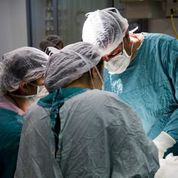Navidea Data For Manocept CD206 May Impact Sarcoma Tumor Cells
Written by Jeff Meyer on 27 Apr 2015

Navidea Biopharmaceuticals, Inc., reported data at the American Association of Cancer Research (AACR) Annual Meeting 2015, demonstrating that the Manocept molecule selectivity binds to, and is continuously internalized by tumor-associated macrophages (TAMs) and Kaposi’s Sarcoma (KS) tumor cells in a preclinical model. The Preliminary results from a clinical study also demonstrated that a single, subcutaneous injection of Technetium Tc 99m tilmanocept (Lymphoseek®), an FDA-approved Manocept-based imaging agent, detects and localizes in Kaposi’s Sarcoma tumors and the lymph nodes involved in draining the Kaposi’s Sarcoma tumor fields.
Navidea President and Chief Executive Officer, Rick Gonzalez, released a statement, “These new results for Navidea’s Manocept program represent an important scientific advance and are a direct result of our oncology expertise and understanding of macrophage targeting in immunology. As the immuno-oncology field continues to show great promise, we believe our CD206 macrophage targeting platform could yield an important new development pathway for future immuno-oncology therapeutics which we expect to be primarily funded through non-dilutive grants. We look forward to presenting additional data supporting and extending the use of Manocept in cancer very soon.”
The Navidea presentation, titled Tumor associated targeting with Manocept: HIV associated Kaposi’s sarcoma as a model system in humans, is established on data from studies conducted by Michael S. McGrath, M.D, Ph.D. and Toby Maurer, M.D., at the University of California San Francisco.
Dr. McGrath, Professor, Departments of Laboratory Medicine, Pathology, and Medicine, UCSF stated, “The Manocept platform’s ability to precisely target the CD206 mannose receptor in both macrophages and tumor cells as seen in this KS model system has the potential for a potent targeting tool to not only identify disease but to deliver therapeutic agents to the tumor cells addressing a broad unmet need for patients with Kaposi’s Sarcoma.”
Navidea Senior Vice President and Chief Scientific Officer and Chief Scientific Officer of Macrophage Therapeutics, Frederick Cope, Ph.D., M.S., FACN commented, “The data generated with human cancer cells confirm that our delivery system can target tumor-associated macrophages, which are critical to the growth and survival of many different forms of cancer.” He continued,“Further, the evidence that the receptor we target, CD206, internalizes our delivery agent provides strong evidence for our therapeutic strategy in KS as well as other forms of solid tumors. Ongoing studies with different therapeutic moieties attached to our delivery platform are underway. We look forward to reporting the complete results of the NAV03-12 study and other results in the near term.”
By using a fluorescent-tagged imaging agent Cy3-Manocept, the presence of CD206, the mannose receptor, on tumor-associated macrophages (TAMs) as well as a majority of Kaposi’s Sarcoma tumor cells was confirmed from fresh KS tissue. The results concluded CD206, was the most prevalent antigen for both KS tumor spindle cells and TAMs and Cy3-Manocept avidly bound to CD206 expressing macrophages. Continuous and ongoing uptake of Cy3-Manocept into CD206 positive macrophages was seen in a time study with doses of increasing Cy3-Manocept concentrations.
The Navidea patient received a single subcutaneous injection of Technetium Tc 99m tilmanocept in the region of the patient’s cutaneous Kaposi’s Sarcoma lesions and imaging was performed 4-hours post-injection to visualize localization of KS in the patients. The scan detected visceral Kaposi’s Sarcoma tumors, showing localization and involved lymph nodes. Complete results of this clinical study are expected to be reported in the coming months.
Sources:

Leave a Reply
You must be logged in to post a comment.